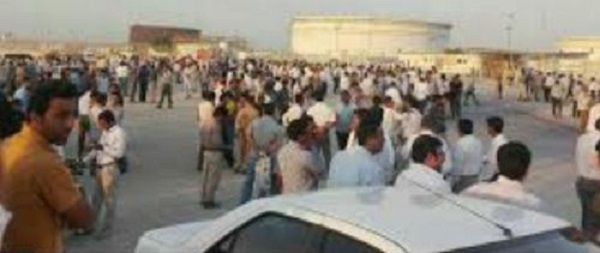
With a strike involving thousands of Haft Tappeh sugarcane refinery workers about to enter its third month, other significant strikes began in Iran at the start of August. Some were in the oil industry where workers at the oil refineries in Mahshar and Qeshem and the petrochemical plant in Lamerd went on strike. Workers at HEPCO, the largest heavy equipment manufacturer in the Middle East, have also started strike action.
The workers’ main demand in these strikes is the payment of unpaid wages and, partly, for unpaid social benefits.
These developments show that the example of the Haft Tappeh strike is spreading to the oil, gas and engineering industries.
These developments are very important, both in terms of the struggle to win the workers’ demands and what they mean for the future of the labour movement in Iran.
Currently, it seems that the Iranian regime does not feel confident enough to fully repress this movement, although repression continues – individual Haft Tappeh strikers have suffered at the hands of the state. The regime’s caution may be a factor in other workers feeling now is the time to take action to support their demands.
These struggles need to be coordinated to maximise pressure on the regime and win the workers’ demands. An important part of this would be establishing organised links between the workplaces and local communities. The creation of joint committees of the striking workers and the wider population could organise solidarity with the strikers. The mobilisation of wider support can take the form of meetings and rallies (subject to necessary ‘social distancing’), and the calling of a 24-hour general strike, at least in the local regions, as the next step in intensifying the struggle for the workers’ demands.
This new series of strikes could mark the beginning of a new wave of the protests by workers and youth that have repeatedly occurred since 2017.
Workers have increasingly organised themselves in what are, at best, semi-legal trade unions, while facing sometimes severe punishment.
Health and economic crisis
These movements are against the background of a severe crisis in Iran, both in the economy and the peoples’ health. The economy, already suffering from the effect of sanctions, has been hit by the impact of Covid-19 while the pandemic has reportedly killed tens of thousands. Despite this, the Iranian stock exchange is booming, at least for now. The regime, divided and in crisis, has no solutions.
The strikes also pose the question of the control over Iran’s future. The issues of democratic and trade union rights, political freedom and free elections, will be seen as vital in breaking the grip of the religious elite that run the country.
Repeated scandals, like the current trial of a high government official for corruption, highlight the question of who owns and controls Iran’s resources. Calls have already been made for the opening of companies’ accounts so that workers and the whole of society can see what happened to the profits companies that made in recent years. It is significant that the Haft Tappeh workers have demanded the renationalisation of their privatised company and that it is run by the workforce.
Such calls raise the issue of workers’ control and management of the administration of companies and, more generally, the question of who runs society. In the 1978/9 revolution, many hoped that an “Islamic Republic” really meant a ‘republic of the poor’ but the opposite has been the case.
The only viable alternative to Iran being ruled by an unstable alliance of capitalists and a religious elite is a government of workers’ and poor representatives that runs society in a democratically organised way. Such a government would have an immediate appeal to workers and youth in the Middle East and beyond.
It is necessary to organise international solidarity since Iran workers and youth are fighting one of the most brutal and repressive regimes in the world. Torture and murder are regularly the regime’s answer to work stoppages by workers wanting to enforce their basic rights.
Clear calls need to be made from trade unionists and others internationally demanding the release of political prisoners in Iran, an end to repression and the organisation of activities in solidarity with the strikes and protests.
Steps must be taken to genuinely aid this rebirth of the Iranian workers’ movement and warn against it against accepting false ‘solidarity’ from capitalist governments. Trump and other imperialist leaders want to utilise opposition to the Iran regime for their own objectives while also seeking to prevent the growing Iranian workers’ movement moving in an anti-capitalist and socialist direction. This underscores the need for Iranian workers to have their own independent mass party, with clear socialist objectives.
